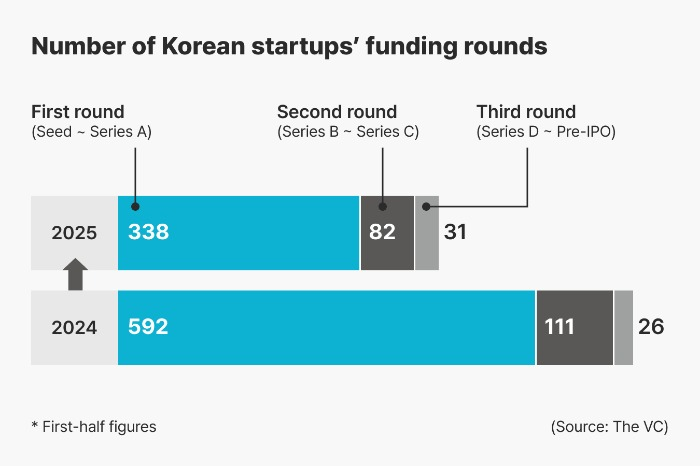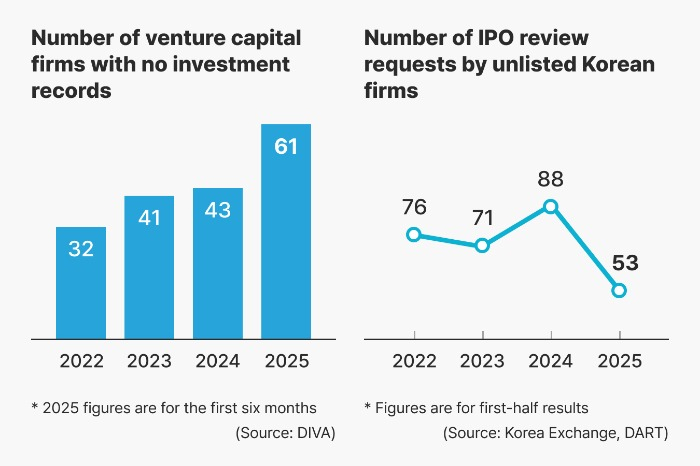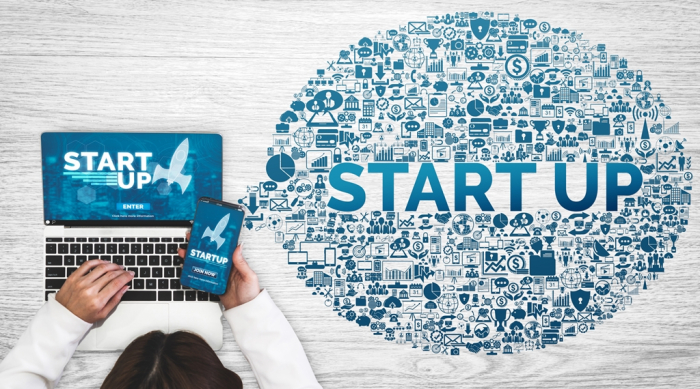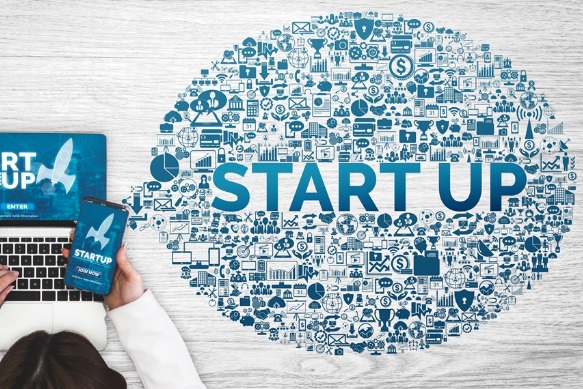Summary:
South Korea's startup funding is at its lowest in over a decade, with VC firms retreating from investments due to a lack of IPOs and M&As for exits.
17% of licensed VC firms made no investments in H1, up from previous years, creating a vicious cycle that threatens the ecosystem.
State-backed funds have failed to alleviate the crisis, as short-term injections can't fix the underlying exit channel problems.
Startups are struggling to secure early-stage funding, with seed-to-Series A deals dropping 43%, forcing a focus on revenue-proof companies.
The over-reliance on public capital (over 25% of the market) risks long-term damage to innovation and competitiveness in Korea's venture landscape.
The Sharp Decline in Korean Startup Funding
South Korea's startup community is grappling with its most severe funding squeeze in over a decade, as venture capital (VC) firms pull back from new investments. Cash-strapped founders are sounding the alarm, warning that these fundraising challenges could lead to the collapse of the country's entire startup ecosystem.
According to the Korean Venture Capital Association (KVCA), one in five registered venture firms made no investments in the first half of this year. Out of 355 licensed VC firms in the country, approximately 17%—or 61 firms—reported zero investments in the first six months. This marks a significant increase from 43 in all of 2024, 41 in 2023, and 32 in 2022.
Analysts point to a vicious cycle driven by the scarcity of initial public offerings (IPOs) and mergers and acquisitions (M&As), which are essential for VC firms to recoup their investments. This lack of exit opportunities limits the capital returned to investors, known as limited partners (LPs), who provide funds to venture capital firms. As a result, VCs have little appetite or capacity to back new companies.

State-Backed Funds Fall Short
In contrast to the US, which saw a 75.6% year-on-year surge in venture funding to $162.8 billion in the first half, Korea's venture capital market has contracted. Government efforts to mitigate the freeze through expanded contributions from state-backed "funds of funds" have done little to reassure founders. A Seoul-based venture capitalist noted, "Short-term liquidity injections cannot break the negative chain reaction in the market."

The Disappearance of Venture Capitalists
The contraction has already taken its toll. A venture house in Andong, North Gyeongsang Province, established in 2018 to support seed-stage companies, lost its license this month after failing to make any new investments in the first half. Sources revealed that the firm's capital impairment ratio soared above 50%, and repeated government warnings rendered it unable to continue operations, even with minimal staffing.
Other funds face similar fates as exits become increasingly difficult. Applications for IPO reviews at the Korea Exchange plummeted nearly 40% year-on-year to 53 in the first six months. High-profile companies like K Bank, DN Solutions, and Lotte Global Logistics have all postponed their listing plans, deepening despair in the venture capital industry.

A VC partner in Seoul emphasized, "There are simply no exits. Without liquidity events, we cannot recycle capital, and without capital, we cannot invest." The retreat of limited partners has exacerbated the issue, with pension funds and securities houses shifting focus to safer assets, stalling new fund creation. One venture capital manager, who launched a firm two years ago, recounted visiting 35 potential LPs this spring, with only three willing to commit.
Startups in Peril
The brunt of this crisis is borne by Korea's youngest startups, which rely heavily on early-stage investors. According to The VC, a domestic venture funding platform, seed-to-Series A deals plunged nearly 43% year-on-year to 338 in the first half. Investors are increasingly crowding into more mature, revenue-generating companies, offering them final-stage funding rounds.
The founder of an AI startup in Gangnam, southern Seoul, shared, "In the past, you could secure funding with just a strong idea and a good team. Now you need to prove revenue and profit and have a track record just to get a meeting. I worry that innovation itself is being snuffed out."

Industry observers warn that this freeze could undermine the long-term competitiveness of the Korean startup industry. The ecosystem has grown increasingly dependent on government-engineered public money. The Ministry of SMEs and Startups reported that state-backed policy capital accounted for 16.7% of newly raised venture funds in 2023, rising to 23% last year. When including pension funds and mutual aid associations—technically private but public in character—more than a quarter of the market now relies on state-related capital.
A venture capital analyst in Seoul cautioned, "Without a healthier balance of private capital and functioning exit channels, the Korean venture landscape could face lasting damage."









Comments